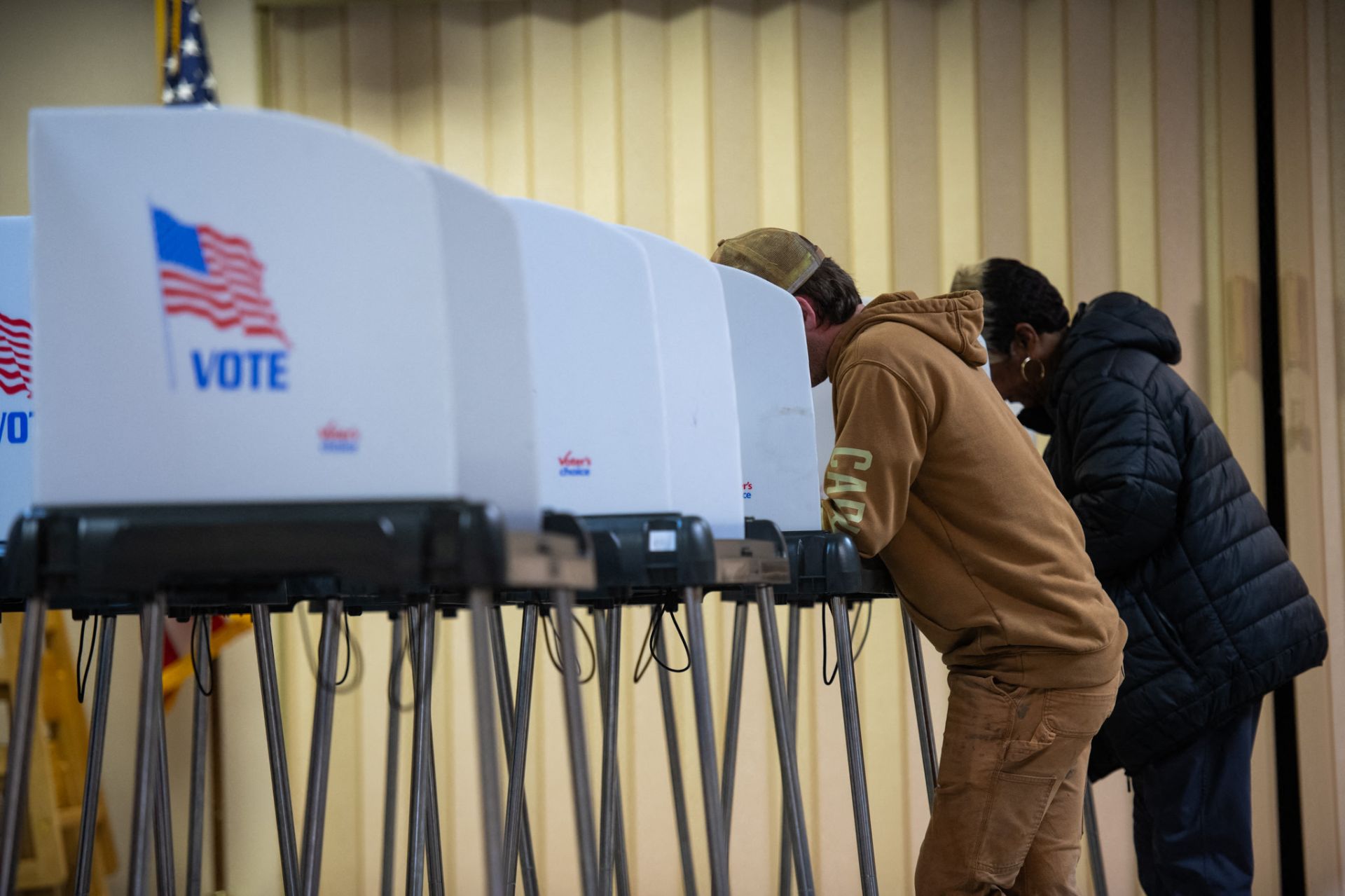- Home
- Middle East
- US Presidential Election: Why Results May Not Be Known Tonight

First time voter, Braxton Edwards, 21, left, marks his ballot on November 5, 2024 in Tryon, North Carolina. Americans cast their ballots today in the presidential race between Republican nominee former President Donald Trump and Democratic nominee Vice President Kamala Harris, as well as multiple state elections that will determine the balance of power in Congress. ©Photo by Melissa Sue Gerrits / GETTY IMAGES NORTH AMERICA / Getty Images via AFP
Americans are currently casting their votes to decide whether Donald Trump or Kamala Harris will be the next occupant of the White House. However, it's unlikely that the results will be revealed immediately, given the unpredictability surrounding the election.
Voting procedures and the high risk of contested results could extend the wait by several days, as was the case in the 2020 election. The winner was announced on November 7, four days after the polls closed. In that election, Donald Trump claimed victory and alleged irregularities, a stance that eventually led his supporters to attack the Capitol on January 6, 2021.
During the last presidential election in 2020, official results were released four days after voting, largely due to the time required to process mail-in ballots.
Counting Mail-in and Early Votes Takes Time
Voters have various options for casting their ballots, including mail-in voting, a practice that dates back to the Civil War (1861-1865), when it allowed soldiers to vote from the battlefield. Over time, this method has been extended across all states under varying conditions. Today, seven states—Oregon, Utah, California, Washington, Colorado, Nevada, and Hawaii—have fully replaced in-person voting with mail-in voting, according to Massachusetts Institue of Techonology (MIT) Election Data.
Mail-in voting is growing in popularity. In the last presidential election, over 43% of voters opted to vote by mail, partly due to the COVID-19 pandemic, according to an Associated Press article. Counting these ballots takes longer than in-person votes, as they involve identity verification and matching signatures or IDs in some states.
Additionally, Americans are voting on numerous local races, judges, sheriffs, and referenda on November 5. Processing these extensive ballots can be time-consuming. While some states start counting mail-in ballots before Election Day, others, like Wisconsin, do not allow any counting until that day, which can delay the final results, according to information cited by Time Magazine.
This year, legal challenges also arose over the validity of mail-in ballots that were sent before November 5 but received afterward. Each state makes its own rules since the election process is decentralized. States have until December 11 to certify results, six days before the Electoral College convenes, as reported on MSNBC.
Legal Challenges Expected in Key Swing States
Like in 2020, the presidential election may come down to narrow margins in a few battleground states, such as Pennsylvania, Michigan, Wisconsin, Georgia, North Carolina, Arizona, and Nevada. According to a Reuters report, legal battles have already started, with the Republican Party filing over 120 challenges in 26 states to contest electoral rules and cast doubt on official results.
In Georgia, Republicans tried to impose a manual count of ballots, aiming to slow the process and block certification in case of defeat. In Arizona, the Supreme Court reinstated a law requiring proof of US citizenship to register to vote in response to a conservative request. In Pennsylvania, the Supreme Court denied a Republican request to prevent voters from correcting mail-in ballots with errors, as reported by CNN.
According to a Bloomberg report, Democrats and civil rights groups have also filed lawsuits. In Pennsylvania, the Democratic National Committee unsuccessfully sought to have undated mail-in ballots counted. In Alabama, progressive groups sued to overturn a directive from the Republican Secretary of State restricting the vote of certain residents.
These legal battles are likely to continue beyond November 5, especially in close states. While these challenges may not change the results, they could fuel distrust among supporters of the losing candidate, potentially leading to protests or political tension.
Donald Trump Prepared to Challenge Possible Defeat
Throughout the campaign, Trump has maintained that any loss would result from a Democratic-led fraud. In 2020, he made similar claims about mail-in voting leading to widespread fraud and costing him the election. Should he lose this year, he is expected to do everything possible to challenge the outcome.
Trump and his allies have prepared an extensive network to contest the results, with thousands of volunteers monitoring the voting process on November 5. This includes 200,000 observers, election workers, and legal experts, as reported by The Wall Street Journal. A conservative group has also developed a website to report suspected fraud and track “electoral irregularities.”
A recent poll conducted by the Public Region Research Institute shows that 19% of Republicans believe Trump should contest the results if he loses and take every possible step to gain power.
Read more



Comments